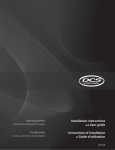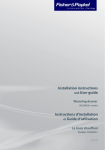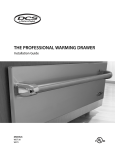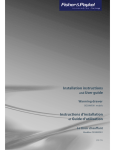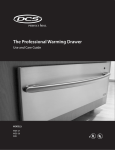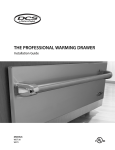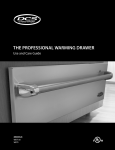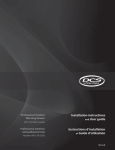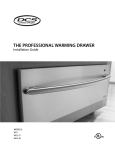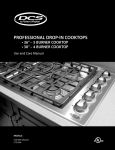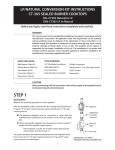Download DCS WDT-30 WDTI Operating instructions
Transcript
THE PROFESSIONAL WARMING DRAWER Use and Care Guide MODELS: WDT-30 WDTI A MESSAGE TO OUR CUSTOMERS Thank you for selecting this DCS Warming Drawer. Because of its unique features, we have developed this Use and Care Guide. It contains valuable information on how to properly operate and maintain your new Warming Drawer for years of safe and enjoyable use. To help serve you better, please fill out and submit your Product Registration by visiting our website at www.dcsappliances.com and selecting “Customer Care” on the home page and then select “Product Registration”. In addition, keep this guide handy, as it will help answer questions that may arise as you use your new DCS Warming Drawer. For your convenience, product questions can be answered by a DCS Customer Care Representative by phone: 1-888-936-7872, or email: [email protected]. NOTE: Please write the Model, Code, and Serial Numbers on this page for references (located at the front right hand side of the body of the drawer). MODEL NUMBER CODE SERIAL NUMBER NOTE: Inspect the product to verify that there is no shipping damage. If any damage is detected, call the shipper and initiate a damage claim. DCS by Fisher & Paykel is not responsible for shipping damage. DO NOT discard any packing material (box, pallet, straps) until the unit has been inspected. WARNING The warming drawer is not intended to be used in conjunction with water. DO NOT fill the drawer or warming cavity with water. Doing so could create a shock hazard, resulting in a possible injury. WARNING TO REDUCE THE RISK OF INJURY TO PERSONS IN THE EVENT OF A WARMING DRAWER GREASE FIRE, OBSERVE THE FOLLOWING: SMOTHER FLAMES with a close-fitting lid, cookie sheet, or metal tray, then turn off the Warming Drawer. BE CAREFUL TO PREVENT BURNS. If the flames do not go out immediately EVACUATE AND CALL THE FIRE DEPARTMENT. NEVER PICK UP A FLAMING PAN - You may be burned. DO NOT USE WATER, including wet dishcloths or towels - a violent steam explosion will result. Use an extinguisher ONLY if: 1. You know you have a Class ABC extinguisher, and you already know how to operate it. 2. The fire is small and contained in the area where it started. 3. The fire department is being called. 4. You can fight the fire with your back to an exit. WARNING DO NOT use water on grease fires. Turn OFF the warming drawer, then smother the fire with baking soda or use a dry chemical or foam-type fire extinguisher. PLEASE RETAIN THIS MANUAL FOR FUTURE REFERENCE. 1 TABLE OF CONTENTS SAFETY PRACTICES & PRECAUTIONS 3-4 FEATURES 5 OPERATING INSTRUCTIONS 6 CARE AND MAINTENANCE Cleaning the Warming Drawer Removing the Drawer Replacing the Drawer 7 8 9 SUGGESTED TEMPERATURE SETTINGS TO KEEP FOODS HOT 10 SERVICE 11 WARRANTY 2 12-13 SAFETY PRACTICES & PRECAUTIONS READ AND UNDERSTAND THESE PRECAUTIONS ■ Read this Use and Care Manual thoroughly before using your new appliance. This will help to reduce the risk of fire, electric shock, or injury to persons. ■ Remove all packaging materials from your appliance. If the installer has not set up your appliance, do it now. ■ Install according to instructions. To insure proper installation and servicing, follow the installation guide which came with this appliance. ■ Be sure to have a qualified service technician install and ground this appliance. ■ Plug into rated outlet: 120 Volts AC, 5 amp min., 15 amp max. circuit requirement. PREHEATING INSTRUCTIONS The Warming Drawer is designed to keep cooked foods warm for extended periods of time. The drawer must be pre-heated before use (see chart on Operational Guide, page 6). If the warming drawer isn’t pre-heated, the internal temperature of the food being warmed could fall below the minimum safe level and bacteria could develop. Always preheat the drawer according to the instructions described in the warming drawer use section of this manual. ■ Children should not be left alone or unattended in an area where appliances are in use. They should never be allowed to turn knobs, push buttons, sit or stand on any part of an appliance. ■ Children in walkers, or children crawling can be attracted to the round door handle and may grab and open the warming drawer. This can result in injury from the door being pulled open on a child, or severe burns if it is in use and hot. WARNING Do not store items of interest to children in, above or around any appliance. Children could be seriously injured if they should climb onto the appliance to reach these items. Be certain to use only dry pot holders: Moist or damp pot holders on hot surfaces may cause burns from steam. Do not use a towel or other bulky cloth in place of pot holders. ■ Never store anything in the warming drawer. Flammable materials can catch fire, plastic items may melt or ignite and other types of items could be ruined. ■ Do not hang articles from any part of the appliance or place anything against the drawer. Some fabrics are quite flammable and could catch on fire. ■ For safety reasons and to avoid damage to the appliance, never sit, stand, or lean on the warming drawer door. ■ For personal safety, wear proper apparel. Loose fitting garments or hanging sleeves should never be worn while using this appliance. Some synthetic fabrics are highly flammable and should not be worn while using this appliance. ■ Do not use aluminum foil to line any part of the warming drawer. Using a foil liner could result in a fire hazard, or the obstruction of the flow of heat and ventilation air. Foil is an excellent heat insulator and heat will be trapped underneath it. This trapped heat can upset the performance of the warming drawer parts. WARNING This appliance is designed for warming food. Based on safety considerations, never use the warming drawer to warm or heat a room. 3 SAFETY PRACTICES & PRECAUTIONS ■ As with any cooking or heating appliance, never leave the warming drawer unattended when warming food, this could be a fire hazard. ■ Only certain types of glass, heat proof glass-ceramic, ceramic, earthenware or glazes are suitable for use in this warming drawer. Utensils that are not thermally heat safe may break with sudden temperature changes. ■ Never heat unopened containers, a build up of pressure may cause the container to burst. ■ 120 volt AC, 5 amp min., 15 amp max. circuit requirement. ■ Grease is flammable, avoid letting grease deposits collect in the warming drawer, clean up spillage. ■ DO NOT use water on grease fires. Turn OFF the warming drawer, then smother the fire with baking soda or use a dry chemical or foam-type fire extinguisher. ■ When opening the drawer while keeping sauces warm, tomato sauce, etc., the drawer must be opened slowly to avoid spillage. ■ Use care when opening a hot warming drawer; to avoid severe burns, open slowly, allow the hot air or steam to escape before reaching in to remove or replace any foods. ■ Do not repair or replace any part of this appliance unless it is specifically recommended in this manual. All other servicing should be referred to a qualified Service Technician. Service Technicians must disconnect the power supply before servicing this appliance. ■ When using the warming drawer: DO NOT TOUCH THE INTERIOR SURFACES or the exterior area immediately surrounding the door until it has had sufficient time to cool to avoid burn injuries. ■ Clean the warming drawer with caution. Avoid steam burns; do not use a wet sponge or cloth to clean the appliance while it is hot. Some cleaners produce noxious fumes if applied to a hot surface. Follow directions provided by the cleaner manufacturer. ■ Be sure all the controls are turned off and the appliance is cool before using any type of aerosol cleaner on or around the appliance. The chemical that produces the spraying action could, in the presence of heat, ignite or cause metal parts to corrode. ■ Do not touch the heating element or interior surfaces of the warming drawer, even if they appear dark in color. They may still be hot enough to cause burn injury. Allow sufficient time to cool. ■ Do not allow flammable materials which may ignite to come in contact with the hot heating element or the interior surface of the warming drawer until the unit has had a sufficient time to cool. 4 FEATURES * Vent Holes Thermostat Control Knob * Moist/ Crisp Knob Removable Stainless Steel Tray * Power Indicator Lens Power Indicator Light Model and Serial tag location on inside panel Stainless Steel Drawer * Not available on fully integrated model (WDTI). Fig. 01 5 OPERATING INSTRUCTIONS OPERATIONAL GUIDE The Warming Drawer is designed to keep previously cooked foods at a safe, warm temperature, for extended periods of time, when operated correctly. It is not designed to cook or reheat food. The Warming Drawer should be pre-heated according to the chart below prior to inserting the food to be warmed. Food may be kept up to two hours in the warming drawer. Failure to pre-heat could result in unsafe food temperatures, which could accelerate the formation of bacteria in the food being kept warm. The dial on the top right corner of the unit is the on/off and temperature control adjustment. When the dial is turned clockwise from the off position to the proof position, the unit will maintain a temperature of approximately 100°F. By rotating the dial clockwise to the high position, the drawer will reach a temperature of approximately 250°F. Fig. 02 To Use: Turn the thermostat dial to a temperature setting; H–High M–Medium L– Low P–Proofing ■ If you will be using the tray, preheat it while preheating the warming drawer. ■ Preheat any empty serving dishes to be used, while preheating the drawer. ■ Add cooked, hot food in its cooking container or heat-safe container. ■ Aluminum foil may be used to cover food containers. CAUTION Do not use plastic containers or plastic wrap. They can melt if in direct contact with the drawer or a hot utensil and if these items melt, they may adhere to the drawer and may be unremovable. Use only heat-safe dishes. PREHEAT TIME AND TEMPERATURE SELECTOR: Proofing.....Do not preheat 90°-110° Low..............Preheat 10 min. 140°-170° Medium ....Preheat 15 min. 170°-200° High............Preheat 20 min. 200°-250° ■ Always preheat on high, then turn the knob to the desired setting. ■ To keep several different foods hot together, set the temperature to the food needing the highest setting. Place items needing highest setting on the bottom of the drawer and food needing less heat on the tray. PROOFING YEAST DOUGH Place dough in a greased jelly roll or half sheet pan or oiled bowl, no taller than five inches in height. Turn dough over to grease all areas of the dough, cover with a damp clean cloth. Place in the center of warming drawer and turn the control knob to proofing (P). Check at 45 minutes to one hour. Dough should double in size. Shape dough, place in baking pan, and put in warming drawer for second rising, about 30 to 45 minutes; add extra time if needed. 6 CARE AND MAINTENANCE CLEANING THE WARMING DRAWER ■ Be careful cleaning any part of this appliance, particularly the drawer box and back of the drawer face. All parts of the drawer can be cleaned with a hot soapy damp cloth, rinsed, dried and buffed with a heavy pile cloth. Always try this first, as it is the mildest cleaning procedure. ■ Be sure the Warming Drawer is turned off and the appliance is cool before using any type of aerosol cleaner on or around the appliance. The chemical that produces the spraying action could, in the presence of heat, ignite or cause metal parts to corrode. ■ Use the mildest cleaning procedure first. Some brands of cleaners are harsher than others, read their directions. Try on a small area first. ■ To avoid marring the surface always rub the metal finishes in the direction of the polish grain lines. The cleaner will be more effective when used in the direction of the polish lines. ■ Use only clean sponges, soft cloths, paper towels, plastic or non-metal soap pads for cleaning or scouring, as recommended in this section. (Caution: some soap pads can scratch). ■ Be sure to rinse all parts thoroughly and to wipe dry to avoid water marks. ■ Remove food particles after every used. 1. Drawer: Clean the drawer with warm soapy damp sponge or cloth. 2. Drawer Front: Shine with stainless steel cleaner in direction of grain. 3. Gasket: Clean with with hot water only. Do not rub. Press a dry towel on the gasket to dry. Do not remove or damage the mesh. 4. Knobs: The on/off temperature knob may be removed to be cleaned. The moist/crisp knob, however, should never be removed. Be aware that the pull off force of the knobs will decrease and a loose knob could become a choking hazard for small children. 5. Light: Clean with damp cloth or sponge. 6. Element: Care should be taken when cleaning the heating element. Only clean the element when the unit is cool. Use warm soapy water on damp cloth. 7. Stainless Steel tray: Can be removed and cleaned with hot soapy water at sink. 7 CARE AND MAINTENANCE REMOVING THE DRAWER Turn the unit off. Be sure the drawer is cool and no food items or trays are in the drawer. Never attempt to remove the drawer while the unit is on or warm. 1. To remove the drawer, first remove plates, trays, etc., from the drawer. 2. Pull the drawer open towards you all the way until it reaches the stop position (Fig. 03). 3. Unlock the drawer by lifting up the tab on the left hand side (Fig. 04) and pressing down the tab on the right hand side (Fig. 05) while pulling the drawer open at the same time (Fig. 06). Note: Removing the drawer for the very first time does require extra force. 4. Keep pulling the drawer open until the slides are separated. Fig. 03 Fig. 04 Fig. 05 Fig. 06 8 CARE AND MAINTENANCE REPLACING THE DRAWER WARNING With the drawer removed, the heating element is exposed. Never turn the unit on while the drawer is removed. Never let children play near or touch the warming drawer while it is not safely installed. Push the slides back into the cabinet while the drawer is removed to prevent accidents. 1. To reinstall the drawer, push the slides fully inside. 2. Position the drawer in front of the cavity and align the slides (Fig. 07). 3. With the slides aligned, push the drawer all the way inside (Fig. 08). NOTE: When the drawer is re-installed, the slides may feel stiff and hard to push in. This is normal. Pull the drawer back out to realign the rollers. The drawer should now feel smooth and free. Fig. 07 Fig. 08 ADJUSTING THE LATCH The latch can be repositioned vertically by adjusting the two torx screws. The force necessary to open and close the drawer can be changed by adjusting the two flathead screws (Fig. 09). Flathead screw Torx screws Flathead screw Fig. 09 9 TEMPERATURE SETTINGS SUGGESTED TEMPERATURES TO KEEP FOODS HOT FOOD TEMPERATURE SLIDE KNOB COVERED/ POSITION UNCOVERED Beef** Rare Low Moist Covered Medium Med Moist Covered Well Done Med Moist Covered High Crisp Uncovered Proofing Moist Covered Casseroles Med Moist Covered Chips High Crisp Uncovered Cooked Cereal Med Moist Covered Eggs Med Moist Covered Fish, Seafood Med Moist Covered Fried Foods (all) High Crisp Uncovered Fruit Med Moist Covered Garlic Bread, Rolls Low Moist Covered Gravy, Cream Sauces Med Moist Uncovered Ham Med Moist Covered Lamb Med Moist Covered Meat Loaf Med Moist Covered Pancakes, Waffles High Moist Uncovered Pies, one crust Med Moist Uncovered Pies, two crust Med Crisp Uncovered Pizza Med Crisp Uncovered Pork Med Moist Covered Potatoes, baked High Crisp Uncovered Potatoes, hash browns High Crisp Uncovered Potatoes, mashed Med Moist Covered Poultry High Moist Uncovered Vegetables Med Moist Covered Bacon Bread Dough **USDA/FSIS recommends an internal temperature of 1450 F as the minimum doneness for beef. Use a portable meat thermometer to check internal temperatures. 10 SERVICE HOW TO OBTAIN SERVICE: Before you call for service: 1. Is the circuit breaker tripped or the fuse blown? 2. Is there a power outage in the area? For warranty service, please contact your local service provider or DCS Customer Care Representative at (888) 936-7872. Before you call, please have the following information ready: ■ Model Number (located at the front right hand side of the body of the drawer) ■ Serial Number (located at the front right hand side of the body of the drawer) ■ Code (located at the front right hand side of the body of the drawer) ■ Date of installation ■ A brief description of the problem Your satisfaction is of the utmost importance to us. If a problem cannot be resolved to your satisfaction, please write or email us at: Write: Fisher & Paykel Appliances, Inc. Attention: DCS Customer Care 5900 Skylab Road Huntington Beach, CA 92647 email: [email protected] 11 WARRANTY LIMITED WARRANTY When you purchase a new DCS Professional Warming Drawer you automatically receive a One Year Limited Warranty covering parts and labor for the entire product for servicing within the 48 mainland United States, Hawaii, Washington D.C. and Canada. In Alaska the Limited Warranty is the same except that you must pay to ship the Product to the service shop or the service technician’s travel to your home. Products for use in Canada must be purchased through the Canadian distribution channel to ensure regulatory compliance. FISHER & PAYKEL UNDERTAKES TO: Repair without cost to the owner either for material or labor any part of the Product, the serial number of which appears on the Product, which is found to be defective. In Alaska, you must pay to ship the Product to the service shop or for the service technician’s travel to your home. If we are unable to repair a defective part of the Product after a reasonable number of attempts, at our option we may replace the part or the Product, or we may provide you a full refund of the purchase price of the Product (not including installation or other charges). This warranty extends to the original purchaser and any succeeding owner of the Product for products purchased for ordinary single-family home use. All service under this Limited Warranty shall be provided by Fisher & Paykel Appliances Inc. or its Authorized DCS Service Agent during normal business hours. HOW LONG DOES THIS LIMITED WARRANTY LAST? Our liability under this Limited Warranty for the entire product expires One Year from the date of purchase of the Product by the first consumer. Our liability under any implied warranties, including the implied warranty of merchantability (an unwritten warranty that the Product is fit for ordinary use) also expires One Year (or such longer period as required by applicable law) from the date of purchase of the Product by the first consumer. Some states do not allow limitations on how long an implied warranty lasts, so this limit on implied warranties may not apply to you. THIS WARRANTY DOES NOT COVER: A. Service calls that are not related to any defect in the Product. The cost of a service call will be charged if the problem is not found to be a defect of the Product. For example: 1. Correct faulty installation of the Product. 2. Instruct you how to use the Product. 3. Replace house fuses, reset circuit breakers, correct house wiring or plumbing, or replace light bulbs. 4. Correct fault(s) caused by the user. 5. Change the set-up of the Product. 6. Unauthorized modifications of the Product. 7. Noise or vibration that is considered normal, for example, drain/fan sounds, regeneration noises or user warning beeps. 8. Correcting damage caused by pests, for example, rats, cockroaches etc. 12 WARRANTY B. Defects caused by factors other than: 1. Normal domestic use or 2. Use in accordance with the Product’s Use and Care Guide. C. Defects to the Product caused by accident, neglect, misuse, fire, flood or Act of God. D. The cost of repairs carried out by non-authorized repairers or the cost of correcting such unauthorized repairs. E. Travel Fees and associated charges incurred when the product is installed in a location with limited or restricted access. (i.e. airplane flights, ferry charges, isolated geographic areas). F. Normal recommended maintenance as set forth in the Product’s Use and Care Guide. If you have an installation problem, contact your dealer or installer. You are responsible for providing adequate electrical, exhausting and other connection facilities. We are not responsible for consequential or incidental damages (the cost of repairing or replacing other property damaged if the Product is defective or any of your expenses caused if the Product is defective). Some states do not allow the exclusion or limitation of incidental or consequential damages, so the above limitation or exclusion may not apply to you. HOW TO GET SERVICE Please read your Use and Care Guide. If you then have any questions about operating the Product, need the name of your local DCS Authorized Service Agent, or believe the Product is defective and wish service under this Limited Warranty, please contact your dealer or call us at: TOLL FREE 1-888-936-7872 or contact us through our web site: www.dcsappliances.com You may be required to provide reasonable proof of the date of purchase of the Product before the Product will be serviced under this Limited Warranty. COMMERCIAL USE This warranty applies to appliances used in residential applications; it does not cover their use in commercial situations. NO OTHER WARRANTIES This Limited Warranty is the complete and exclusive agreement between you and Fisher & Paykel Appliances Inc. regarding any defect in the Product. None of our employees (or our Authorized Service Agents) are authorized to make any addition or modification to this Limited Warranty. Warrantor: Fisher & Paykel Appliances, Inc. If you need further help concerning this Limited Warranty, please call us at the above number, or write to: Fisher & Paykel Appliances, Inc., 5900 Skylab Road, Huntington Beach, CA 92647 This Limited Warranty gives you specific legal rights, and you may also have other rights which vary from state to state. Fisher & Paykel Appliances Inc. is a leading manufacturer of premium quality cooking and specialty appliances under the Fisher & Paykel and DCS brands. 13 NOTES 14 CHAUFFE-PLATS PROFESSIONNEL Manuel d'utilisation et d'entretien MODÈLES: WDT-30 WDTI A L’INTENTION DE NOS CLIENTS Nous vous remercions d'avoir choisi ce chauffe-plats DCS. Nous avons conçu ce Manuel d'utilisation et d'entretien pour expliquer les fonctions uniques de cet appareil. Il contient des informations extrêmement utiles sur la façon correcte de faire fonctionner votre nouveau chauffe-plats et d'en faire l'entretien. Vous pourrez ainsi en profiter pendant des années en toute sécurité. Aidez-nous à mieux vous servir en remplissant l'enregistrement de produit et en nous la soumettant depuis notre site Web à www.dcsappliances.com. Sélectionnez « Customer Care » sur la page d'accueil puis « Product Registration ». De plus, gardez ce manuel à portée de main afin de rapidement trouver réponse à vos questions durant l'utilisation de votre nouvel appareil. Si vous avez des questions au sujet de notre produit, contactez le Centre de service à la clientèle DCS par téléphone : 1-888-936-7872, ou par courriel : [email protected]. REMARQUE : Veuillez noter les numéros de modèle, code, et de série sur cette page pour information (situé sur le panneau droit intérieur de la cavité du tiroir derrière le côté du tiroir droit) NUMÉRO DE MODÈLE CODE NUMÉRO DE SÉRIE REMARQUE : Inspecter le produit pour vérifier qu’il n’a pas été endommagé pendant l’expédition. En cas de dommages, contacter le transporteur et entamer une déclaration pour dommage. DCS by Fisher & Paykel n’est en aucun cas responsable des dommages pendant l’expédition. Ne pas jeter le matériau d’emballage (boîte, palette, sangles) avant d’avoir inspecté l’unité. AVERTISSEMENT Le chauffe-plats n'est pas conçu pour être utilisé avec de l'eau. NE remplissez PAS le tiroir ou le logement du chauffe-plats avec de l'eau. Cela pourrait créer un risque de choc et causer des blessures. AVERTISSEMENT POUR RÉDUIRE LES RISQUES DE BLESSURES EN CAS DE FEU DE GRAISSE SUR Le chauffe-plats, RESPECTEZ LES CONSIGNES SUIVANTES : ÉTOUFFEZ LES FLAMMES à l'aide d'un couvercle hermétique, d'une plaque à biscuits ou d'un plateau métallique, puis éteignez le chauffe-plats. ÉVITEZ DE VOUS BRÛLER. Si les flammes ne s'éteignent pas immédiatement, ÉVACUEZ LES LIEUX ET APPELEZ LES POMPIERS. NE SOULEVEZ JAMAIS UN RÉCIPIENT EN FEU - Vous pourriez vous brûler. N'UTILISEZ PAS D'EAU, y compris des serviettes mouillées - une explosion de vapeur violente pourrait en résulter. Utilisez un extincteur SEULEMENT si : 1. Vous êtes sûr qu'il s'agit d'un extincteur de classe ABC et savez comment le faire fonctionner. 2. Le feu est limité et restreint à la zone où il s'est déclenché. 3. Le service des pompiers a été appelé. 4. Vous pouvez combattre l'incendie le dos tourné vers une sortie. AVERTISSEMENT NE VERSEZ PAS d'eau sur les feux de graisse. Éteignez le chauffe-plats, puis étouffez le feu avec du bicarbonate de soude ou à l'aide d'un extincteur à poudre ou à mousse. VEUILLEZ CONSERVER CE MANUEL À TITRE DE RÉFÉRENCE. 1 TABLE DES MATIERES MESURES DE SECURITE ET DE PRECAUTION 3-4 CARACTERISTIQUES DU CHAUFFE-PLATS 5 GUIDE OPÉRATIONNEL 6 INSTRUCTIONS D'ENTRETIEN ET D'UTILISATION Nettoyage du chauffe-plats Retrait du chauffe-plats Replacement du tiroir 7 8 9 REGLAGES DE TEMPERATURE 10 SERVICE 11 GARANTIE 12-13 2 MESURES DE SECURITE ET DE PRECAUTION VEUILLEZ LIRE ET BIEN ASSIMILER CES CONSIGNES ■ Veuillez lire attentivement ce manuel d'utilisation et d'entretien avant d'utiliser votre nouvel appareil. Ceci vous permettra de réduire les risques d'incendie, de chocs électriques ou de blessures. ■ Retirez tout le matériel d'emballage de l'appareil. Si un technicien n'a pas installé votre appareil, faites-le maintenant. ■ Procédez à l'installation conformément aux instructions. Pour assurer une installation et un entretien corrects, respectez les instructions fournies avec l'appareil. ■ Confiez la mise à la terre de l'appareil à un technicien qualifié. ■ Branchez l'appareil dans une prise de 120 V C.A., 5 A min., 15 A maximum requis. INSTRUCTIONS DE PRECHAUFFAGE Le chauffe-plats est conçu pour garder les aliments cuits à une température chaude pendant de longues périodes. Il doit être préchauffé avant toute utilisation (voir tableau en page 5 du Guide opérationnel). Il doit être préchauffé pendant une demi-heure au moins à température maximum. Si le chauffe-plats n'est pas préchauffé, la température interne des aliments chauffés pourrait baisser à un niveau dangereux propice au développement des bactéries. Préchauffez toujours le chauffe-plats selon les instructions de la section du manuel qui traite de l'utilisation de l'appareil. ■ Les enfants ne doivent pas être laissés seuls ou sans surveillance dans un endroit où l'on utilise ce type d'appareil. Il ne faut jamais les laisser tourner ou enfoncer des boutons, ni s'asseoir ou se tenir debout sur l'appareil. ■ Des enfants en marchette ou à quatre pattes peuvent être attirés par la poignée ronde de la porte et la saisir pour ouvrir le chauffe-plats. Ils pourraient alors se blesser ou être brûlés sérieusement si l'appareil est en fonctionnement et qu'il est chaud. AVERTISSEMENT Évitez de ranger des articles pouvant attirer les enfants dans l'appareil, au-dessu ou à proximité. Les enfants pourraient être blessés sérieusement s'ils grimpent sur l'appareil pour atteindre ces articles. Utilisez seulement des gants isolants secs: Les gants humides sur des surfaces chaudes peuvent provoquer des brûlures causées par la vapeur. N'utilisez pas de serviette ou de chiffon épais à la place de gants isolants. ■ Ne rangez jamais rien dans le chauffe-plats. Des matériaux inflammables pourraient prendre feu, des éléments en plastique pourraient fondre ou s'enflammer et d'autres types d'objets pourraient être détruits. ■ Ne suspendez aucun article sur l'appareil et ne placez aucun objet contre lui. Certains matériaux sont extrêmement inflammables et pourraient prendre feu. ■ Pour des raisons de sécurité et pour ne pas endommager l'appareil, évitez de vous asseoir, de vous tenir debout ou de vous appuyer contre la porte du chauffe-plats. ■ Pour assurer votre propre sécurité, habillez-vous de façon appropriée. Ne portez jamais de vêtements ou de manches lâches lorsque vous utilisez l'appareil. Certains tissus synthétiques sont extrêmement inflammables et ne doivent pas être portés pendant l'utilisation de l'appareil. ■ Ne recouvrez aucune partie du chauffe-plats avec du papier aluminium. L'utilisation de papier aluminium peut créer un risque d'incendie ou empêcher la circulation de la chaleur et de l'air de ventilation. C'est un excellent isolant thermique qui peut emprisonner la chaleur. Celle-ci pourrait alors affecter la performance des pièces du chauffe-plats. 3 MESURES DE SECURITE ET DE PRECAUTION AVERTISSEMENT Cet appareil est conçu pour réchauffer les aliments. Pour des raisons de sécurité, n'utilisez jamais le chauffe-plats pour chauffer une pièce. ■ Comme pour tout appareil de cuisson ou de chauffage, ne laissez jamais le chauffe-plats sans surveillance quand vous réchauffez de la nourriture, car il y a risque d'incendie. ■ Seuls certains types d'ustensiles en verre, vitrocéramique calorifugée, céramique, poterie ou émaillés sont appropriés pour être utilisés dans ce chauffe-plats. Les ustensiles non thermorésistants peuvent se briser à la suite de changements de température soudains. ■ Ne chauffez pas de récipients hermétiques car ils pourraient exploser suite à une accumulation de pression. ■ Circuit de 120 V c.a., 5 A min.,15 A maximum requis. ■ La graisse est inflammable. Évitez donc de laisser des dépôts de graisse s'accumuler dans le chauffe-plats et nettoyez tout déversement. ■ NE VERSEZ PAS d'eau sur les feux de graisse. Éteignez le chauffe-plats, puis étouffez le feu avec du bicarbonate de soude ou à l'aide d'un extincteur à poudre ou à mousse. ■ Si vous ouvrez le tiroir et qu'il contient des sauces chaudes, de la sauce tomate, etc., ouvrez-le lentement pour éviter tout déversement. ■ Faites attention quand vous ouvrez un chauffe-plats chaud; pour éviter tout risque de brûlures graves, ouvrez-le lentement en laissant s'échapper l'air chaud ou la vapeur avant de retirer ou d'introduire des aliments. ■ Ne réparez pas ni ne remplacez aucune pièce de cet appareil, sauf indication contraire du manuel. Tout autre travail d'entretien doit être confié à un technicien qualifié. Celui-ci doit débrancher le bloc d'alimentation avant de travailler sur l'appareil. ■ Durant l'utilisation du chauffe-plats : afin d'éviter de vous brûler, NE TOUCHEZ PAS LES SURFACES INTÉRIEURES ni la surface extérieure autour de la porte tant qu'elles n'ont pas refroidi. ■ Nettoyez le chauffe-plats avec précaution. Évitez de vous brûler à la vapeur : n'utilisez pas d'éponge ou de chiffon mouillé pour nettoyer l'appareil alors qu'il est encore chaud. Certains produits de nettoyage produisent des vapeurs nocives s'ils sont appliqués à une surface chaude. Suivez le mode d'emploi fourni par le fabricant du produit de nettoyage. ■ Assurez-vous que les boutons de l'appareil sont fermés et que celui-ci est froid avant d'utiliser des nettoyants aérosol à proximité. L'élément chimique qui produit le jet de vaporisation peut, en présence de chaleur, s'enflammer ou provoquer la corrosion des parties métalliques. ■ Ne touchez par l'élément chauffant ni les surfaces intérieures du chauffe-plats. Même si leur couleur semble sombre, ils peuvent encore être assez chauds pour causer des brûlures. Laissez-leur le temps de refroidir. ■ Ne mettez par des matériaux inflammables pouvant s'enflammer en contact avec l'élément chauffant ou la surface intérieure du chauffe-plats tant que l'appareil n'a pas refroidi. 4 CARACTERISTIQUES DU CHAUFFE-PLATS * Trous de ventilation Bouton de réglage du thermostat * Bouton Humide/Croustillant Plateau en acier inoxydable amovible * Lentille du voyant d'alimentation Voyant d'alimentation Tiroir en acier inoxydable * Non disponible sur le modèle complètement intégré (WDTI). Fig. 01 5 Emplacement de l'étiquette de modèle et de série (situé sur le panneau droit intérieur de la cavité du tiroir derrière le côté du tiroir droit) GUIDE OPÉRATIONNEL GUIDE OPÉRATIONNEL Le chauffe-plats est conçu pour garder les aliments cuits à une température chaude sécuritaire, pendant de longues périodes, à condition d'être utilisé correctement. Il n'est pas conçu pour cuire ou réchauffer les aliments. Le chauffe-plats doit être préchauffé tel qu'indiqué au tableau ci-dessous avant d'y placer des aliments à réchauffer. Les aliments peuvent être gardés dans le chauffe-plats jusqu'à deux heures. S'il n'est pas préchauffé, la température des aliments pourrait baisser à un niveau dangereux propice au développement des bactéries. Le bouton au coin supérieur droit de l'appareil permet de l'allumer et de l'éteindre et de régler le niveau de température. Tournez le bouton à droite, de la position éteint à la position basse température, pour maintenir une température d'environ 38 °C (100 °F). Tournez le bouton à droite, en position de température élevée, pour maintenir le chauffe-plats à environ 121°C (250 °F). Fig. 02 Utilisation : Tournez le bouton thermostatique pour choisir un réglage de température; High (Haut) Medium (Moyen) Low (Bas) Proofing (Apprêt) ■ Si vous comptez utiliser le plateau, préchauffez-le tout en préchauffant le chauffe-plats. ■ Préchauffez tous les plats vides devant être utilisés, tout en préchauffant le chauffe-plats. ■ Ajoutez les aliments cuits dans leurs récipients de cuisson ou des récipients thermorésistants. ■ Vous pouvez couvrir les récipients avec du papier d'aluminium. MISE EN GARDE N'utilisez pas de récipients en plastique ni de film de plastique. Ceux-ci peuvent fondre au contact du chauffe-plats ou d'un ustensile chaud et, dans ce cas, peuvent adhérer au chauffe-plats au point de ne pouvoir être enlevés. Utilisez uniquement des plats thermorésistants. SELECTEUR DE TEMPERATURE : Plage de températures : Apprêt (Proof ).....Ne pas préchauffer 32 °C-43 °C (90 °F -110 °F) Bas (Low)..............Préchauffer 10 min. 60 °C -77 °C (140 °F-170 °F) Moyen (Medium) ....Préchauffer 15 min. 77 °C -93 °C (170 °F-200 °F) Haut (High)............Préchauffer 20 min. 93 °C-121 °C (200 °F -250 °F) ■ Préchauffez toujours sur high (haut), puis tournez le bouton vers le réglage voulu. ■ Pour conserver la chaleur de plusieurs aliments mis ensemble, réglez la température en fonction de celui qui exige la température la plus élevée. Placez les aliments nécessitant le réglage le plus élevé au fond du chauffeplats et la nourriture exigeant le moins de chaleur sur le plateau APPRET LA PATE Placez la pâte dans un roulé à la gelée, une plaque à pâtisserie ou un bol huilé, pas plus haut que 12,7 cm (5 po). Retournez la pâte pour bien la huiler et recouvrez-là d'un linge humide propre. Placez-là au centre du chauffeplats et mettez le bouton de réglage surproof (P)(apprêt). Vérifiez après 45 minutes ou une heure. La pâte devrait avoir doublé de taille. Mettez la pâte en forme, placez-la dans un moule et mettez celui-ci dans le chauffe-plats pour la seconde fermentation, pendant environ 30 à 45 minutes; augmentez la durée au besoin.. 6 ENTRETIEN ET UTILISATION NETTOYAGE DU CHAUFFE-PLATS ■ Faites attention quand vous nettoyez cet appareil, en particulier le boîtier du tiroir et l'arrière de la face du tiroir. Toutes les parties de l'appareil peuvent être nettoyées avec linge humide savonneux chaud, puis rincées, séchées et bien polies à l'aide d'un tissu à poils épais. Essayez cela en premier, c'est la façon la plus douce de le nettoyer. ■ Assurez-vous que le chauffe-plats est éteint et froid avant d'utiliser un nettoyant aérosol quelconque. L'élément chimique qui produit le jet de vaporisation peut, en présence de chaleur, s'enflammer ou provoquer la corrosion des parties métalliques. ■ Employez la méthode de nettoyage la plus douce d'abord. Certains produits de nettoyage sont plus durs que d'autres. Lisez leur mode d'emploi. Faites un essai sur une petite surface au préalable. ■ Pour ne pas gâcher la surface, frottez toujours la finition dans le sens du polissage, ce qui donne plus d'efficacité au nettoyant. ■ Pour nettoyer ou récurer, utilisez uniquement des éponges propres, des tissus doux, des essuie-tout, des tampons à récurer savonneux en plastique ou non-métalliques. (Attention : certains tampons à récurer peuvent égratigner la surface). ■ Rincez soigneusement et séchez en essuyant pour éviter de laisser des marques d'eau. ■ Retirez les particules alimentaires après chaque utilisation. 1. Tiroir : Nettoyez le chauffe-plats à l'aide d'une éponge ou d'un linge humide savonneux tiède. 2. Devant du tiroir : Polissez au moyen d'un nettoyant pour acier inoxydable dans le sens du grain. 3. Joint : Nettoyer à l'eau chaude uniquement. Ne pas frotter. Appuyer une serviette sèche sur le joint pour sécher. Ne pas retirer ni endommager le tamis. 4. Boutons : Vous pouvez retirer le bouton de température pour le nettoye. Toutefois, le bouton moist/crisp (humide/croustillant) ne doit jamais être retiré. En effet, il deviendra facile à décoller et de jeunes enfants pourraient s'étouffer avec. 5. Lumière : Nettoyez à l'aide d'un chiffon ou d'une éponge humide. 6. Élément chauffant : Faites attention lorsque vous nettoyez l'élément chauffant : ne le faites qu'une fois l'appareil refroidi. Utilisez de l'eau tiède savonneuse sur un chiffon humide. 7. Plateau en acier inoxydable : Peut être retiré et nettoyé avec de l'eau savonneuse chaude dans l'évier. 7 ENTRETIEN ET UTILISATION RETRAIT DU CHAUFFE-PLATS Éteindre l'unité. Assurez-vous que le chauffe-plats est froid et qu'aucun aliment ni plateau ne se trouve à l'intérieur. N'essayez jamais de retirer le tiroir lorsque l'appareil est allumé ou chaud. 1. Pour retirer le tiroir, retirez d'abord les plats, plateaux, etc. du tiroir. 2. Ouvrez le tiroir complètement jusqu'à ce qu'il s'arrête. 3. Déverrouiller le tiroir en relevant la languette sur le côté gauche (Fig. 04) et en appuyant sur la languette sur le côté droit (Fig. 05). Ouvrir le tiroir en le tirant en même temps (Fig. 06). Remarque : Il faudra une force supplémentaire pour retirer le tiroir pour la première fois. 4. Continuer à ouvrir le tiroir en le tirant jusqu'à séparation des coulisses. Fig. 03 Fig. 04 Fig. 05 Fig. 06 8 ENTRETIEN ET UTILISATION REPLACEMENT DU TIROIR AVERTISSEMENT Lorsque le tiroir est retiré, l'élément chauffant est exposé. N'allumez jamais l'appareil en l'absence du tiroir. Ne laissez jamais les enfants jouer à proximité du chauffe-plats ou le toucher lorsqu'il n'est pas installé de façon sécuritaire. Pour éviter tout risque d'accident, repoussez les glissières dans le boîtier lorsque le tiroir a été retiré. 1. Pour remettre le tiroir en place, pousser les coulisses complètement à l'intérieur. 2. Placer le tiroir devant la cavité et aligner les coulisses (Fig. 07). 3. Une fois les coulisses alignées, enfoncer complètement le tiroir à l'intérieur (Fig. 08). REMARQUE : Une fois le tiroir remis en place, les coulisses seront peut-être rigides et difficiles à enfoncer. Ceci est normal. Sortir le tiroir en le tirant pour réaligner les roulettes. Le tiroir devrait maintenant fonctionner régulièrement et librement. Fig. 08 Fig. 07 AJUSTAGE DU LOQUET Le loquet peut être repositionné verticalement en ajustant les deux vis Torx. La force nécessaire pour ouvrir et fermer le tiroir peut être modifiée en ajustant les deux vis tête plate (Fig. 09). Flathead screw Torx screws Flathead screw Fig. 09 9 REGLAGES DE TEMPERATURE TEMPERATURES SUGGEREES POUR GARDER LES ALIMENTS CHAUDS ALIMENTS TEMPÉRATURE GLISSEZ LE BOUTON DE POSITION RECOUVERT/ DECOUVERT Saignant Bas Humide Recouvert Demi-saignant Moyen Humide Recouvert À point Moyen Humide Recouvert Bacon Haut Croustillant Découvert Pâte à pain Apprêt Humide Recouvert Casseroles Moyen Humide Recouvert Croustilles Haut Croustillant Découvert Céréales cuites Moyen Humide Recouvert Œufs Moyen Humide Recouvert Poisson, fruits de mer Moyen Humide Recouvert Aliments frits (tous) Haut Croustillant Découvert Fruit Moyen Humide Recouvert Pain à l'ail, petits pains Bas Humide Recouvert Sauce d'arrosage, sauces à la crème Moyen Humide Découvert Jambon Moyen Humide Recouvert Agneau Moyen Humide Recouvert Pain de viande Moyen Humide Recouvert Crêpes, gaufres Haut Humide Découvert Tartes, une croûte Moyen Humide Découvert Tartes, deux croûtes Moyen Croustillant Découvert Pizza Haut Croustillant Découvert Porc Moyen Humide Recouvert Pommes de terre, au four Haut Croustillant Découvert Pommes de terre, pommes de terre rissolées Haut Croustillant Découvert Pommes de terre, purée Moyen Humide Découvert Volaille Haut Humide Découvert Légumes Moyen Humide Recouvert Bœuf** **L'USDA/FSIS recommande comme degré de cuisson minimum pour du bœuf une température interne de 63ºC (145ºF). Utilisez un thermomètre à viande portable pour vérifier la température interne. 10 SERVICE POUR L'OBTENTION DE SERVICE : Avant d'appeler le service technique : 1. Est-ce que le disjoncteur s'est déclenché ou que le fusible est grillé? 2. Y a-t-il une coupure de courant dans le secteur? Pour le service sous garantie, veuillez contacter votre distributeur ou contactez le centre DCS agréé le plus proche au (888) 936-7872. Avant d'appeler, veuillez avoir les informations suivantes à portée de main : ■ Numéro de modèle (situé sur le panneau droit intérieur de la cavité du tiroir derrière le côté du tiroir droit) ■ Numéro de série (situé sur le panneau droit intérieur de la cavité du tiroir derrière le côté du tiroir droit) ■ Code (situé sur le panneau droit intérieur de la cavité du tiroir derrière le côté du tiroir droit) ■ Date d'installation ■ Brève description du problème Votre satisfaction revêt la plus haute importance pour nous. Si un problème n'est pas résolu à votre entière satisfaction, veuillez communiquer par courrier avec notre Centre de service à la clientèle ou email : [email protected] Écrivez-nous à l'adresse suivante : Fisher & Paykel Appliances, Inc. Attention: DCS Customer Care 5900 Skylab Road Huntington Beach, CA 92647 U.S.A. 11 GARANTIE GARANTIE LIMITEE Lors de l'achat d'un chauffe-plats DCS neuve, vous bénéficiez automatiquement d'une garantie limitée d'un an couvrant les pièces et la main d'œuvre pour l'intégralité du produit dans les 48 états continentaux des États-Unis, ainsi que Hawaï, Washington D.C. et le Canada. La garantie limitée est la même en Alaska sauf que vous devez payer les frais d'expédition du produit à un centre de service ou les frais de déplacement d'un technicien dans le cas d'une visite à domicile. Les produits destinés à une utilisation au Canada doivent être achetés auprès d'un distributeur canadien afin de respecter la réglementation en vigueur. FISHER & PAYKEL S'ENGAGE A : Entreprendre à ses frais (pièces et main-d'oeuvre) toutes réparations du produit (sur lequel figure le numéro de série) jugé défectueux. En Alaska, vous devez payer les frais d'expédition du produit à un centre de service ou les frais de déplacement d'un technicien dans le cas d'une visite à domicile. Si nous sommes dans l'incapacité de réparer une pièce défectueuse du produit après un nombre raisonnable de tentatives, nous pourrons, à notre choix, remplacer la pièce ou le produit, ou vous rembourser entièrement le prix d'achat du produit (à l'exclusion des frais d'installation ou autres frais). Cette garantie s'applique à l'acheteur initial et à tous les propriétaires successifs du produit dans la mesure où il s'agit d'un produit acheté pour une utilisation à domicile normale. Tout service couvert par cette garantie limitée sera assuré par Fisher & Paykel Appliances Inc. ou son agent de service DCS agréé durant les heures d'ouverture normales. QUELLE EST LA DUREE DE CETTE GARANTIE LIMITEE ? Notre responsabilité en vertu de cette garantie limitée concernant l'intégralité du produit expire UN AN à partir de la date d'achat du produit par le premier acheteur. Notre responsabilité en vertu de toute garantie implicite, y compris la garantie implicite de qualité marchande (la garantie tacite selon laquelle le produit est approprié pour un usage normal) expire également UN AN (ou une période plus longue si requis par la loi) à partir de la date d'achat du produit par le premier acheteur. Certaines juridictions ne permettent pas la limitation de la garantie implicite, il est donc possible que la limitation cidessus sur les garanties implicites ne s'applique pas à vous. NE SONT PAS COUVERTS PAR LA GARANTIE : A. Les appels de service n'ayant aucun rapport avec un défaut éventuel du produit. Le coût de l'appel de service sera facturé s'il se trouve que le problème n'est pas dû à un défaut du produit. Par exemple : 1. Corriger une mauvaise installation du produit. 2. Montrer comment utiliser le produit. 3. Remplacer des fusibles à domicile, réarmer les disjoncteurs, réparer les fils électriques ou la plomberie du domicile, ou remplacer des ampoules. 4. Corriger des anomalies causées par l'utilisateur. 5. Changer la configuration du produit. 6. Modifications non autorisées du produit. 7. Bruits ou vibrations considérés comme normaux, par exemple les bruits de drain ou de ventilateur, les bruits de régénération (vibrations, sifflements) ou les signaux d'avertissement à l'intention de l'utilisateur. 8. Corriger des dommages causés par des animaux nuisibles, par exemple des rats, des coquerelles, etc. B. Défauts causés par des facteurs autres que : 1. Utilisation domestique normale ou 2. Utilisation conformément aux indications du guide d'utilisation et d'entretien du produit. 12 GARANTIE C. Défauts du produit pour cause d'accident, négligence, mauvaise utilisation, incendie, inondation ou calamité naturelle. D. Les coûts des réparations effectuées par des techniciens non autorisés ou le coût de correction de ces réparations non autorisées. E. Les frais de voyage et les frais connexes encourus lorsque le produit est installé dans un lieu à accès illimité ou restreint (déplacement par avion ou par bateau, régions géographiques isolées, etc.). F. Entretien normal recommandé parle manuel d'utilisation et d'entretien du produit. Contactez votre distributeur ou votre installateur en cas de problème d'installation. Il vous incombe d'assurer une installation électrique, une ventilation et toute autre connexion appropriées. Nous ne sommes pas responsables des dommages indirects ou accessoires (coût de réparation ou de remplacement d'autres biens endommagés parce que le produit était défectueux ou tout autre coût que vous auriez encouru parce que le produit était défectueux). Certaines juridictions interdisent l’exclusion ou la restriction de la responsabilité des dommages indirects ou accessoires; l’exclusion ou la restriction indiquée cidessus peut donc ne pas s'appliquer à votre cas particulier. POUR OBTENIR DES REPARATIONS Veuillez consulter le manuel d'utilisation et d'entretien. Si vous avez des questions concernant l'utilisation du produit, que vous cherchez le nom de l'agent de service DCS agréé local ou que pensez que le produit est défectueux et désirez le faire réparer dans le cadre de cette garantie limitée, veuillez contacter votre distributeur ou nous appeler au numéro suivant : (NUMÉRO SANS FRAIS) 1-888-936-7872 ou contactez-nous par l'intermédiaire de notre site Web : www.dcsappliances.com. Vous devrez peut-être présenter une preuve raisonnable de la date d'achat du produit avant de pouvoir bénéficier d'une réparation dans le cadre de cette garantie limitée. UTILISATION COMMERCIALE Cette garantie s'applique à des appareils électroménagers utilisés à domicile; elle ne couvre pas les cas d'utilisation commerciale. AUCUNE AUTRE GARANTIE Cette garantie limitée constitue l'accord entier et exclusif entre vous et Fisher & Paykel Appliances Inc. en ce qui concerne tout défaut du produit. Aucun de nos employés (ou agents de service agréés) n'est autorisé à apporter des ajouts ou des modifications à cette garantie limitée. Garant : Fisher & Paykel Appliances, Inc. Si vous avez besoin d'aide au sujet de cette garantie limitée, veuillez nous appeler au numéro ci-dessus ou nous écrire à l'adresse suivante : Fisher & Paykel Appliances, Inc. Attention : DCS Customer Care 5900 Skylab Road, Huntington Beach, CA 92647 États-Unis Cette garantie limitée vous donne des droits juridiques spécifiques et vous pouvez bénéficier d'autres droits qui varient d'une juridiction à l'autre. Fisher & Paykel Appliances inc. est un fabricant de pointe d'appareils de cuisson et d'appareils spécialisés, sous les marques Fisher & Paykel et DCS. 13 Fisher & Paykel Appliances, Inc. 5900 Skylab Road, Huntington Beach, CA 92647 Customer Care: 888.936.7872 Fax: 714.372.7003 www.dcsappliances.com As product improvement is an ongoing process, we reserve the right to change specifications or design without notice. Nous améliorons constamment ses produits et se réserve le droit de modifier les spécifications ou la conception de ses produits sans aucun préavis. P/N 241265 Rev. B Litho in USA 08/2008

































